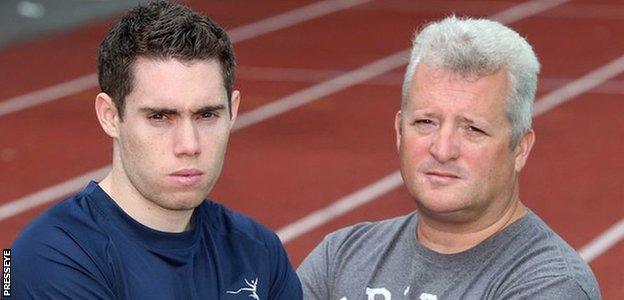Tokyo Paralympics: Jason Smyth leans on experience to find golden moment in Japan
- Published
Tokyo Paralympics: Jason Smyth wins sixth gold medal by one-hundredth of a second in T13 100m final
One hundredth of a second.
Those not enamoured with sprinting outside of its flagship events at Olympics, Paralympics and World Championships might consider it a relatively uncomplicated discipline.
In the early years of his sprinting career perhaps Jason Smyth did too.
"Jason initially wouldn't have had the drive to study," says Stephen Maguire, who coached Smyth from a teenager to a four-time Paralympic champion by 2012, and who remains an important voice in his camp.
"He has developed those qualities to really understand his craft and self-reflect."
By his own admission Smyth did not arrive in Tokyo in prime condition. Injury hit preparations hard; speed and strength were not as finely tuned as they have been in the finest moments of a career that has enjoyed legendary status for years.
A win at these Games was going to require leaning on something other than the electric speed that propelled him into Para-athletics folklore.
Smyth's reputation precedes him. He knows that, and so do his competitors. Putting himself in a position of control in the final became the focus of his preparations as Sunday evening drew near.
"We spoke after his heat [earlier on Sunday], and it was really about executing the start," said Maguire.
"Both of us agreed that was really what he had to do. At that level, particularly over 100m, if you can put somebody under pressure, which he did, then it is hard to come back."
A fast start presents the chance of an early lead. A lead 60m into a 100m race can force the trailing pack to push too hard, working themselves out of their rhythm in a desperate attempt to recover the ground.
Algeria's Skander Djamil Athmani came back strong. Almost strong enough to end Smyth's unbeaten record in major championships, but by the barest of margins the Irishman held on.
Allow X content?
This article contains content provided by X. We ask for your permission before anything is loaded, as they may be using cookies and other technologies. You may want to read X’s cookie policy, external and privacy policy, external before accepting. To view this content choose ‘accept and continue’.
It was a win owed to tactical nous as much as performance, the amalgamation of well over a decade's experience in how to come out on top when the chips are down.
"Early on in his career he probably would have lost that race because he would have tried to fight it and technique would have fallen apart," Maguire said.
"In his early days he lost races because he pressed too much at the end.
"It sounds a bit strange but he wanted it too much and he tried to run fast at the end of the race, whereas in reality it's about holding positions and holding the speed you've got. You don't get any quicker in the last 30m of 100m, you can only get a little slower.
"He brought a lot of patience into that race today. He held position and it got him through."
'He couldn't become a full-time athlete straight away'
Smyth was 16 when he began working with Maguire, who was appointed Scottish Athletics' director of coaching in 2012 before becoming head of power for British Athletics.
Since returning to home shores at the beginning of the year to take up the role of head of high performance coaching at Sport Ireland, Maguire has again been helping in Smyth's Paralympic preparations.
The athlete of today, a 34-year-old father of two now with six Paralympic gold medals, has set the standard for a generation of para-athletes. Not bad for a man who in the first instance had sporting priorities beyond the track.
"If Jason had a choice he would have played football but because of his visual impairment that was ruled out. His first love is football," Maguire explained.
"In the early days we used to get some strange looks because we'd chuck a football about in training, just to keep his motivation.
"That was one of the biggest tricks. When you're working with someone at 16 or 17 whose ultimate dream would be to play football, but whose opportunities would have been really limited, you still had to keep that interest because he couldn't become a full-time athlete straight away."

Maguire (right) coached Smyth between 2004-2012
Smyth has publicly registered his interest in competing at Paris 2024, by which time he would be 37. There is, he believes, more to come and with an uninterrupted build-up, improvements still to be made.
It is a view shared by Maguire, who knows as well as anyone Smyth's approach to his craft.
"The biggest memory [from the early years] is that he was always thirsting to learn. You could see that he had a hunger to progress and be the best he could be, and he got stuck in," he said.
"His biggest understanding has been what it takes to win. Today wasn't about times, it wasn't being as fast as ever, it was bringing a process into a race that he was going to put every other athlete under pressure knowing he was going to be a half step away from what he could have been because of injury."
Half a step away from his blistering best perhaps. And yet still, thanks to a career of getting the job done in the biggest moments, the world's fastest Paralympian found that crucial hundredth of a second.